The Best AI Tools for Business: Customer Service Edition
Before the rise of intelligent virtual assistants (IVAs) and chatbots, delivering exceptional customer support was an impossible task for most businesses. Limited resources and the overwhelming influx of customer inquiries often hampered efforts to maintain prompt, personalized service.
Back then, the concept of AI-powered knowledge management systems or sentiment analysis tools was science fiction. Businesses relied on traditional methods, like manually logging customer interactions and sifting through paper trails. Fast forward to today, and AI customer success tools have transformed the support landscape.
Imagine offering 24/7 assistance with the help of virtual support agents, while gaining valuable customer satisfaction insights through AI-powered analytics, all without exceeding your budget. This article delves into the intricacies of these customer service AI solutions. We'll explore how they can revolutionize your support operations, weigh the advantages and disadvantages, and equip you to overcome any potential hurdles.
Can you actually use AI to improve customer success?
AI is revolutionizing customer service by offering businesses a powerful one-two punch: increased efficiency and personalized experiences. For starters, AI-powered chatbots and virtual assistants can handle a significant portion of customer inquiries, particularly those involving frequently asked questions or routine tasks like order tracking. This frees up human agents to focus on more complex issues that require a personal touch. Additionally, AI can analyze customer data to identify buying habits, past inquiries, and even sentiment within conversations. This allows businesses to personalize the support experience by offering targeted recommendations, proactively addressing potential problems, and tailoring interactions to individual customer needs. With AI handling the heavy lifting, customer support teams can become more efficient and effective, ultimately leading to happier and more loyal customers.
Are there drawbacks to using AI in improving customer support?
Pros
- Increased Efficiency and Speed: AI-powered chatbots and virtual assistants can handle a significant portion of customer inquiries, particularly those involving frequently asked questions or routine tasks like order tracking. This frees up human agents to focus on more complex issues that require a personal touch.
- 24/7 Availability: AI customer service tools can provide support to customers around the clock, 365 days a year. This is especially beneficial for businesses that operate in multiple time zones or have a global customer base.
- Improved Personalization: AI can analyze customer data to identify buying habits, past inquiries, and even sentiment within conversations. This allows businesses to personalize the support experience by offering targeted recommendations, proactively addressing potential problems, and tailoring interactions to individual customer needs.
- Data-Driven Insights: AI can analyze customer interactions to identify trends and areas for improvement. This data can be used to improve the quality of customer service, develop new products and services, and gain a better understanding of customer needs.
Cons
- Lack of Emotional Intelligence: AI chatbots and virtual assistants can struggle to understand the nuances of human emotion. This can lead to frustrating interactions for customers who are feeling upset or frustrated.
- Limited Problem-Solving Abilities: AI systems are not always able to resolve complex customer issues. In these cases, customers may need to be escalated to a human agent, which can lead to longer wait times and frustration.
- Initial Investment Costs: Implementing AI customer service tools can require a significant upfront investment in technology and training.
- Job Displacement Concerns: There is a concern that AI could lead to job losses in the customer service sector. However, it is more likely that AI will displace repetitive tasks, allowing human agents to focus on more complex and strategic work.
Level Up Your Customer Success Game: Top AI Tools to Boost Engagement and Retention
PixieBrix
PixieBrix isn't your average AI customer support tool. Sure, it can answer your customers' questions with greater speed and precision by embedding AI across the tools you already use. But PixieBrix goes beyond basic chatbots. It leverages the power of decision tree-making software to guide users through complex processes step-by-step. This empowers customers to find solutions independently, reducing the burden on your support team. PixieBrix also boasts a powerful AI-powered knowledge base assistant, allowing your team to surface relevant information quickly and ensure consistent answers.

- AI Copilot: Helps users with tasks like research and writing by generating content and summarizing information. Works on most web pages including Twitter, Zendesk, Gmail, and more. Copy responses to your clipboard or automatically insert at your cursor. Ask questions in natural language and receive fast responses powered by generative AI. Save conversations and go back to them later to explore deeper and clarify information as needed.
- AI Knowledge Base: Fetch trusted, relevant information from your knowledge base, shared drive, or other internal resource. Answer questions more reliably and with greater ease. Wow every customer!
- Decision Trees: Boost team performance with powerful decision tree software. Supercharge agent speed-to-production by providing step-by-step guidance and eliminating knowledge-base hunting, making even newbies to customer service heroes in a flash.
- AI Writing: Your AI writing assistant to ensure clear, on brand, and error-free communication. Works where you work. Write like a pro!
- Process Intervention: Trigger warnings and guidance to ensure rules and procedures are followed. Create an audit trail for any process.
The best part? PixieBrix is completely free.
Zendesk
Zendesk isn't just a name in customer support software anymore; it's a comprehensive platform wielding the power of AI to elevate customer experiences throughout their entire lifecycle. Zendesk AI is built on billions of real customer service interactions. It can understand customer experience and automate tasks to improve efficiency. AI agents can answer customer questions and resolve issues. This frees up human agents to focus on more complex tasks. Zendesk AI can also be used to personalize customer support. Zendesk's AI capabilities encompass a well-rounded suite of tools:
- Answer Bot: This AI-powered chatbot deflects routine inquiries by intelligently surfacing relevant knowledge base articles and self-service options, freeing up human agents for complex issues.
- Smart Assist: Acting as a virtual sidekick for agents, Smart Assist suggests relevant macros, articles, and customer data in real-time, ensuring efficient and personalized interactions.
- Satisfaction Prediction: By analyzing customer sentiment throughout support interactions, Zendesk AI predicts potential dissatisfaction, allowing proactive intervention and improved customer retention.

Ada
Ada stands out as a maestro of AI, conducting a symphony of customer support and success. Unlike traditional chatbots, Ada boasts a robust AI engine that understands natural language and context. This allows for nuanced conversations, deflecting common inquiries and guiding users towards the right solutions. Here's how Ada elevates customer experiences:
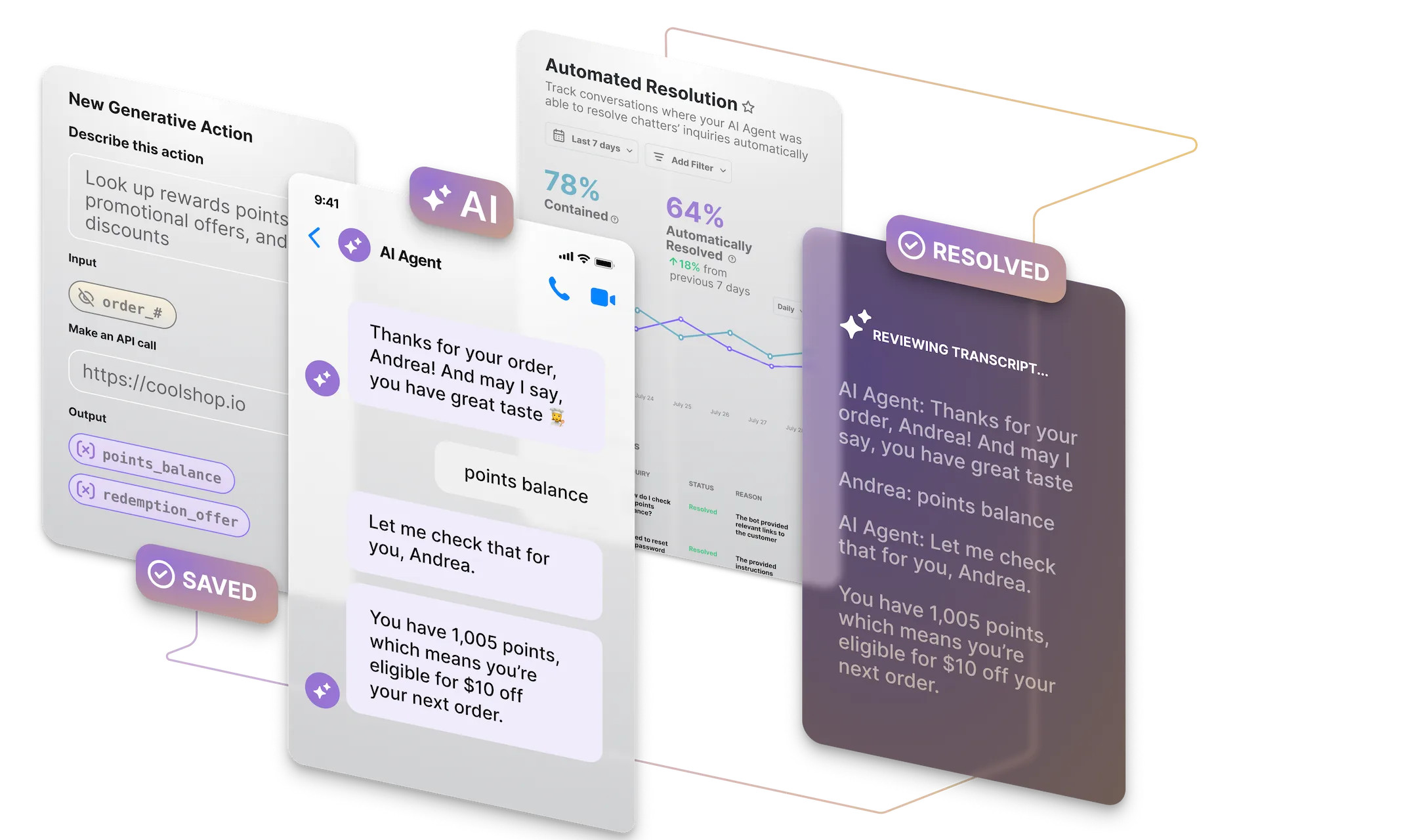
- Multi-Channel Maestro: Ada seamlessly integrates across various communication channels – webchat, phone, email, social media – offering a consistent and frictionless experience for customers, no matter how they choose to connect.
- AI-Powered Knowledge Base: Forget clunky keyword searches. Ada's AI surfaces the most relevant knowledge base articles based on the user's specific query, ensuring they get the most accurate and helpful information quickly.
- Proactive Success nudges: By analyzing customer behavior and identifying potential roadblocks, Ada can deliver targeted prompts and suggestions, guiding users proactively towards successful outcomes and boosting overall product adoption.
Ada goes beyond reactive support, leveraging its AI prowess to orchestrate a smooth and successful customer journey across all touchpoints.
Kustomer

Kustomer takes a customer relationship management (CRM) approach to AI-powered customer experiences. It automates repetitive tasks, deflects simple inquiries for faster resolution, and equips agents with a complete customer view, fostering more efficient and personalized interactions. Their platform integrates AI across various functionalities to optimize both support and success:
- AI Chatbots and Self-Service: Kustomer's AI chatbots deflect common inquiries, offering self-service options and directing users to relevant knowledge base articles. This reduces burden on human agents.
- AI Agent Assist: Kustomer equips agents with AI-powered support. Real-time data and suggested responses empower agents to resolve issues efficiently.
- Customer Journey Insights: Kustomer leverages AI to analyze customer interactions. These insights identify areas for improvement and opportunities to proactively address potential roadblocks, fostering customer success.
Balto
Balto focuses on empowering human agents through real-time AI guidance. Unlike solely AI-driven solutions, Balto equips agents with the knowledge and resources they need to deliver exceptional customer service. This translates to several key benefits:
- Increased Efficiency: Balto provides real-time suggestions for next steps, relevant knowledge base articles, and even scripting guidance, all within the agent's workflow. This minimizes research time and allows agents to resolve issues faster.
- Improved Accuracy: Balto's AI ensures consistent and accurate information is delivered to customers, reducing errors and enhancing overall service quality.
- Personalized Interactions: By leveraging customer data and past interactions, Balto helps agents tailor their approach to each customer's unique needs.
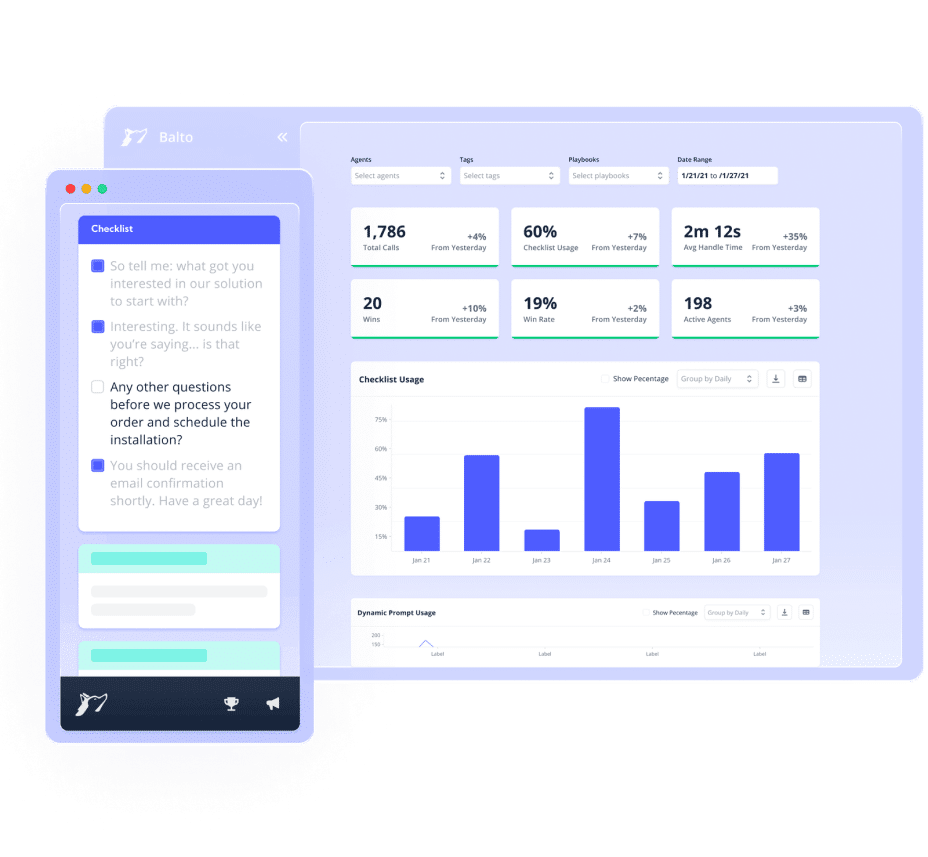
Fin
Fin, from Intercom, steps beyond basic chatbots, offering a sophisticated AI solution designed to streamline customer support workflows. Fin tackles repetitive tasks and deflects common inquiries with precision. Here's how Fin delivers value:
- Automated Resolution: Fin utilizes natural language processing to understand customer questions and leverages your existing knowledge base to provide instant and accurate answers.
- 24/7 Availability: Fin offers uninterrupted support, deflecting inquiries outside business hours or when agents are unavailable, ensuring customer needs are always addressed promptly.
- Seamless Agent Handover: For complex issues requiring human interaction, Fin intelligently escalates conversations to support agents, equipping them with relevant context for a smooth handover and faster resolution.
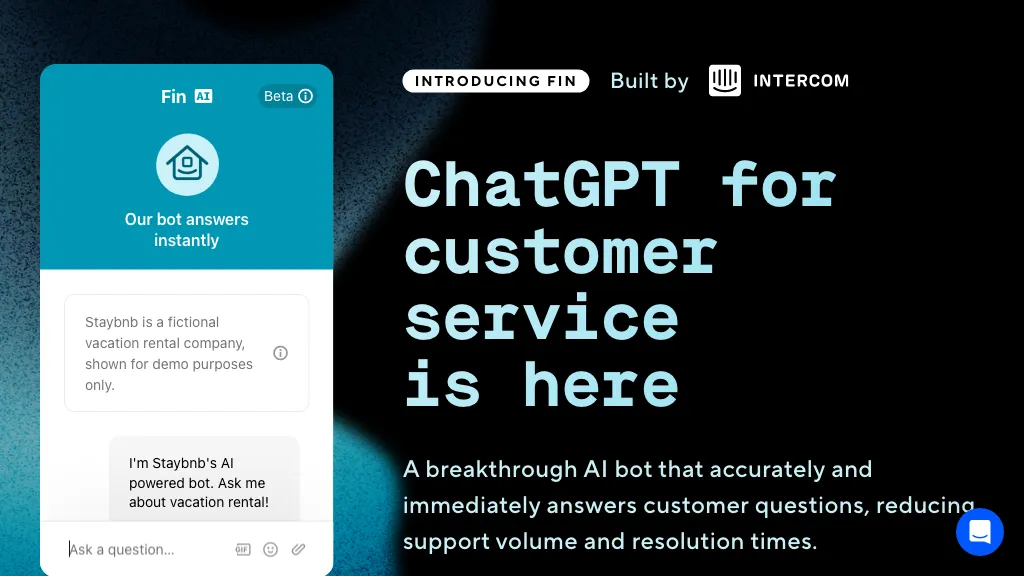
According to Intercom, Fin can resolve over 50% of customer support questions instantly and accurately, it can be activated in minutes by pointing it at your support content, it does not require any training, configuration, or new bot paths, and it can be enriched with custom answers for important questions and seamlessly passes conversations to your support team for anything else.
Hiver
Hiver doesn't take a traditional AI route for customer support. Instead, it focuses on empowering teams through intelligent collaboration features. By automating workflows, centralizing knowledge, and facilitating collaboration, Hiver empowers support teams to deliver efficient and effective customer service, ultimately driving higher customer success.
- Shared inboxes: Hiver allows teams to collaborate on customer emails by using shared inboxes. This means that multiple agents can see the same email thread and work together to resolve customer queries.
- Labels, views, and tags: Hiver allows teams to organize and track emails with labels, views, and tags. This can help teams to prioritize emails and ensure that no inquiries fall through the cracks.
- Rule-based automations: Hiver can automate mundane tasks, such as auto-assigning emails to agents. This can free up agents' time to focus on more complex issues.
- Shared drafts, notes, and mentions: Hiver allows teams to collaborate on email drafts by using shared drafts, notes, and @mentions. This can help to ensure that all team members are on the same page and that emails are sent out promptly.
- Analytics and reporting: Hiver provides analytics and reporting tools that can help teams track their performance and identify areas for improvement. These tools can track metrics such as response time, resolution time, and customer satisfaction.
Velaris
Velaris empowers B2B SaaS teams with AI to elevate customer success and support. This platform consolidates and analyzes all customer data in a user-friendly interface, generating valuable insights that drive proactive, data-based decisions. Velaris helps Customer Success teams understand their customers, streamline their operations and save hours of manual work.

- Smart To-Do Lists: Never miss a beat with AI that scans your conversations and activities, automatically generating personalized to-do lists for each customer success rep.
- Lightning-Fast Writing: Effortlessly summarize account information and draft insightful responses with the help of Velaris' generative AI writing assistant, all within the app.
- Uncover Customer Sentiment: Gain valuable insights into customer satisfaction by leveraging AI-powered sentiment analysis. This feature helps you understand how customers feel about your product and specific features.
- Automated Insights, Actionable Results: Velaris analyzes customer communication and behavior to automatically generate high-impact tasks, ensuring your team takes proactive steps towards customer success.
Tidio
Tidio AI is a suite of AI-powered automation tools built right into Tidio's customer service software. Designed specifically for small and medium-sized businesses (SMBs), Tidio AI helps streamline support processes, saving you valuable time and resources.
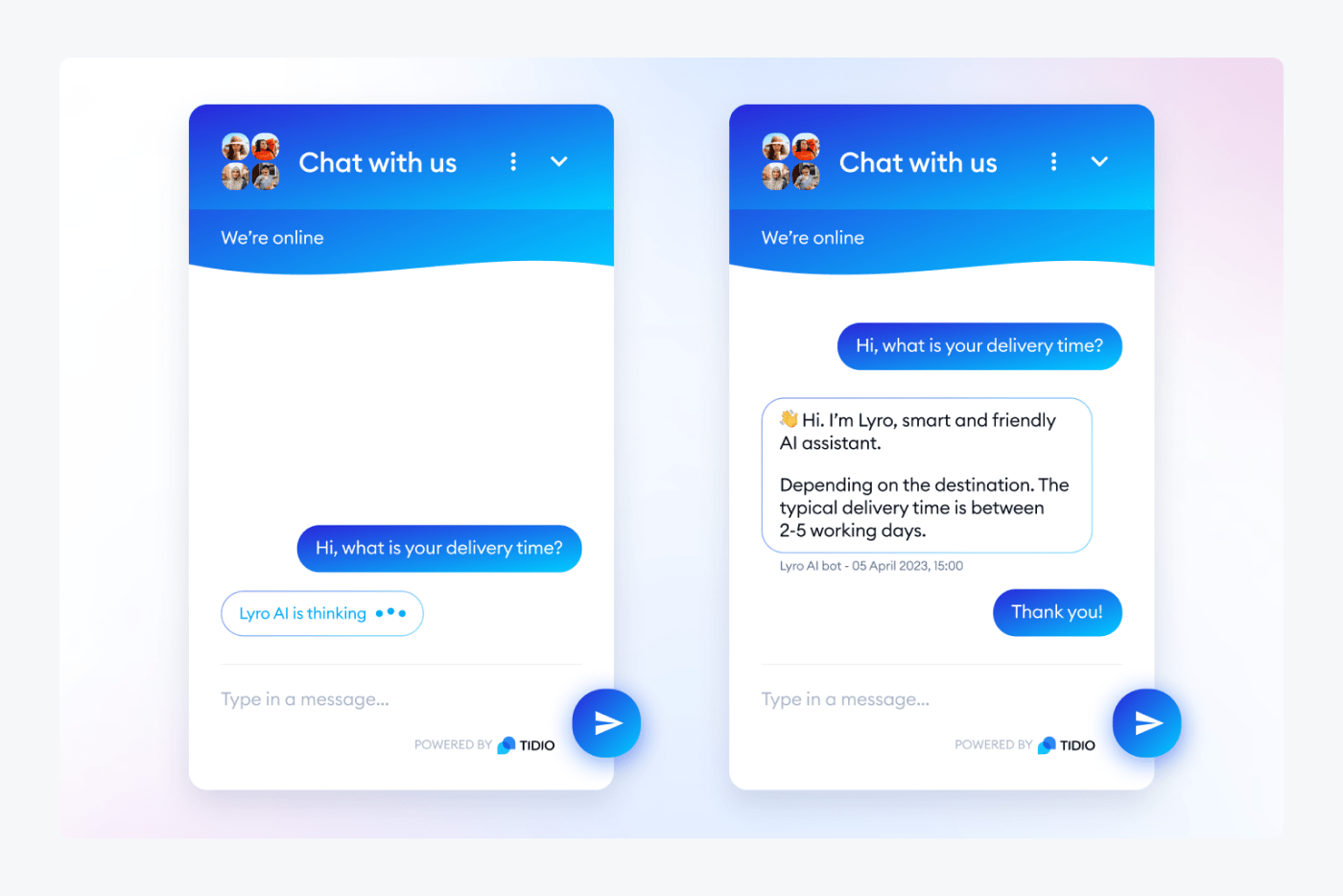
At the heart of Tidio AI lies Lyro, a conversational AI bot powered by natural language processing. Lyro engages in natural-sounding conversations with your customers, answering frequently asked questions by drawing from your existing knowledge base. This frees up your human agents to focus on more complex issues, leading to faster resolution for everyone.
- Lyro, Tidio's AI chatbot, tackles up to 70% of routine customer inquiries, freeing your human agents for complex issues. Even during peak hours, Lyro can handle multiple conversations simultaneously, ensuring no customer gets left on hold.
- Gone are the days of limited chatbot options. The AI Phrase Matcher leverages natural language processing (NLP) to craft responses that resonate with each user, creating a more personalized experience.
- Tidio's Customer Questions feature uses AI to categorize inquiries instantly, delivering relevant answers from the get-go. The system continuously learns, becoming adept at addressing recurring questions over time.
Chatfuel
Chatfuel takes a unique approach to AI-powered customer support. It offers a user-friendly bot builder that leverages OpenAI's API and the GPT-4 model. This empowers businesses to create chatbots that address basic customer inquiries, answer product-related questions, and even generate product recommendations. The platform's flexibility allows businesses to tailor chatbots for marketing, sales, or even basic customer support functions.
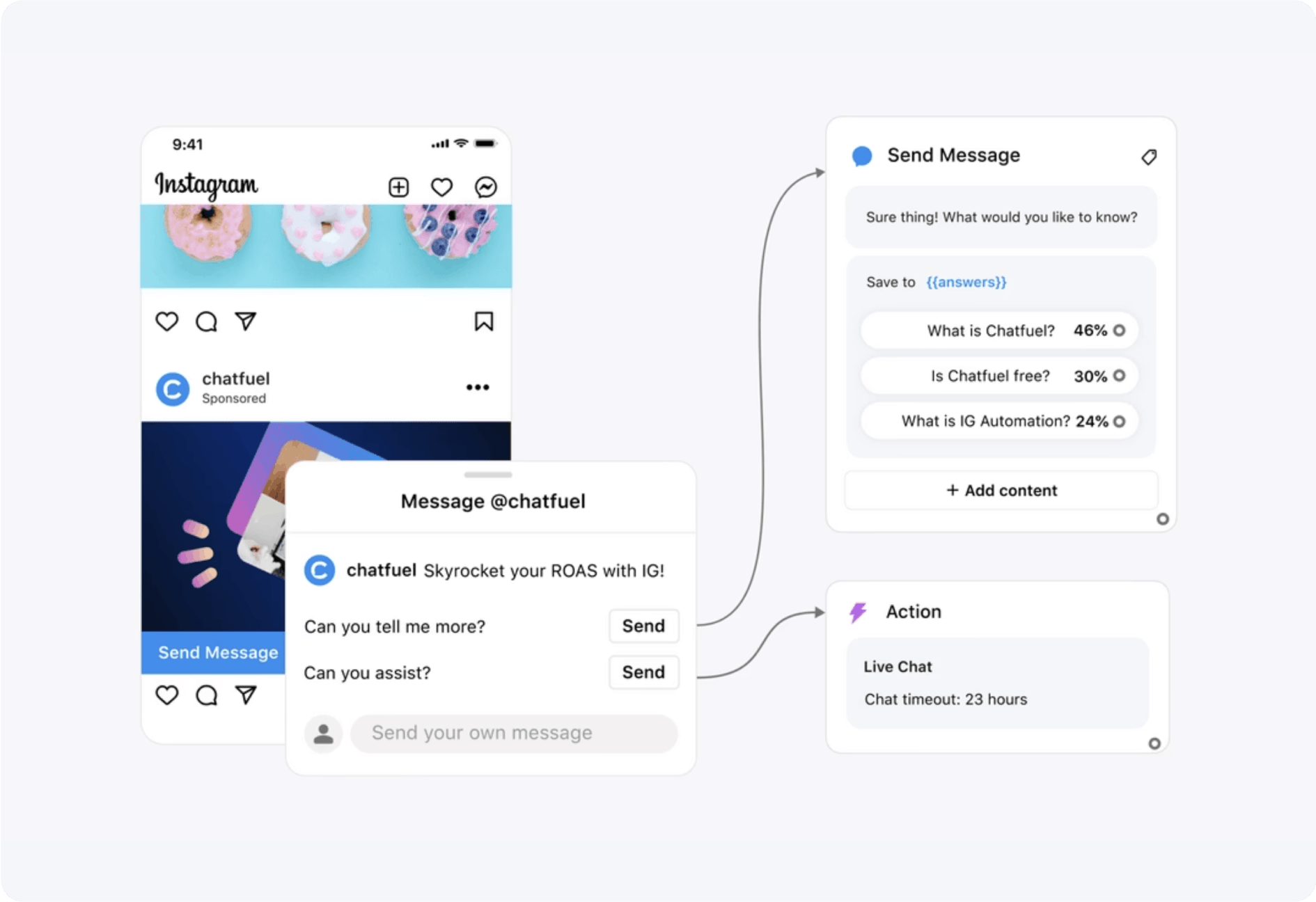
- User-Friendly Bot Builder: Chatfuel offers a drag-and-drop interface that allows businesses to create chatbots without needing extensive coding knowledge.
- OpenAI API and GPT-4 Integration: Chatfuel leverages OpenAI's API and the powerful GPT-4 model, enabling chatbots to understand natural language and respond in a human-like way.
- Multi-Purpose Functionality: Chatbots built with Chatfuel can be customized for various purposes, including marketing (e.g., lead generation), sales (e.g., product recommendations), and basic customer support (e.g., answering FAQs).
Freddy AI
Built into every Freshworks Chat and Enterprise plan, Freddy is an AI-powered customer service tool designed to enhance efficiency. This generative AI solution focuses on three key areas:
- Automations: Streamline repetitive tasks and free up human agents for more complex issues.
- Self-Service: Empower customers to find solutions independently through a user-friendly knowledge base.
- Ticket Deflection: Reduce support tickets by intelligently deflecting common inquiries with AI-powered responses.
One of Freddy's features is Freddy Copilot, a 24/7 AI assistant offering context and insights to improve team productivity. While valuable across departments, it's important to note that Freddy Copilot may not offer the in-depth customer service functionalities found in dedicated support solutions.

- Freddy Self Service: With Freddy Self Service, you can deploy intelligent chatbots to resolve issues day and night, quickly and consistently. More deflections means more time for agents to focus on higher-value tasks.
- Freddy Copilot: With Freddy Copilot, employees have an AI coach and collaborator to help improve their performance. Freddy Copilot can summarize issues, suggest next steps, and handle repetitive tasks—all with easy, conversational prompts.
- Freddy Insights: Get proactive, AI-driven insights to help you anticipate issues and spot opportunities, so you don’t miss a thing. With Freddy Insights, you can make informed decisions more quickly. You can even ask Freddy for recommendations and data visualizations.
Custify
Custify empowers SaaS businesses to leverage customer interaction data for growth. This platform acts as a central hub, consolidating customer data from various sources and transforming it into actionable insights. While Custify can be used for basic customer service functions, its true strength lies in customer success. It goes beyond support by tracking customer lifecycles, product adoption, and sales opportunities, empowering you to build stronger customer relationships and drive long-term success.
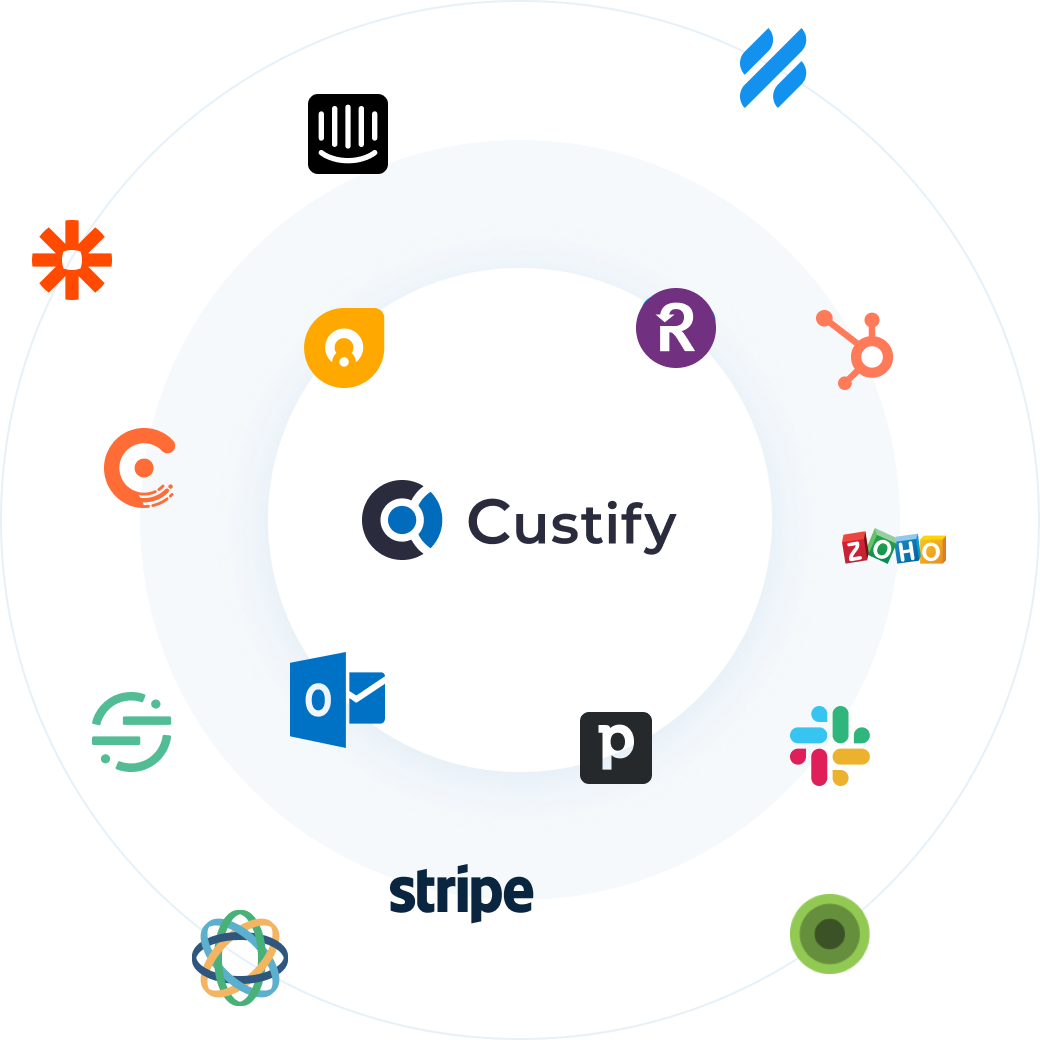
- Customer Satisfaction: Identify areas for improvement and ensure customer delight.
- Customer Lifecycle: Understand customer journey stages and tailor experiences accordingly.
- Upsell Opportunities: Proactively identify upsell and cross-sell potential, boosting revenue growth.
- Churn Risk: Predict and prevent customer churn by addressing potential issues before they arise.

